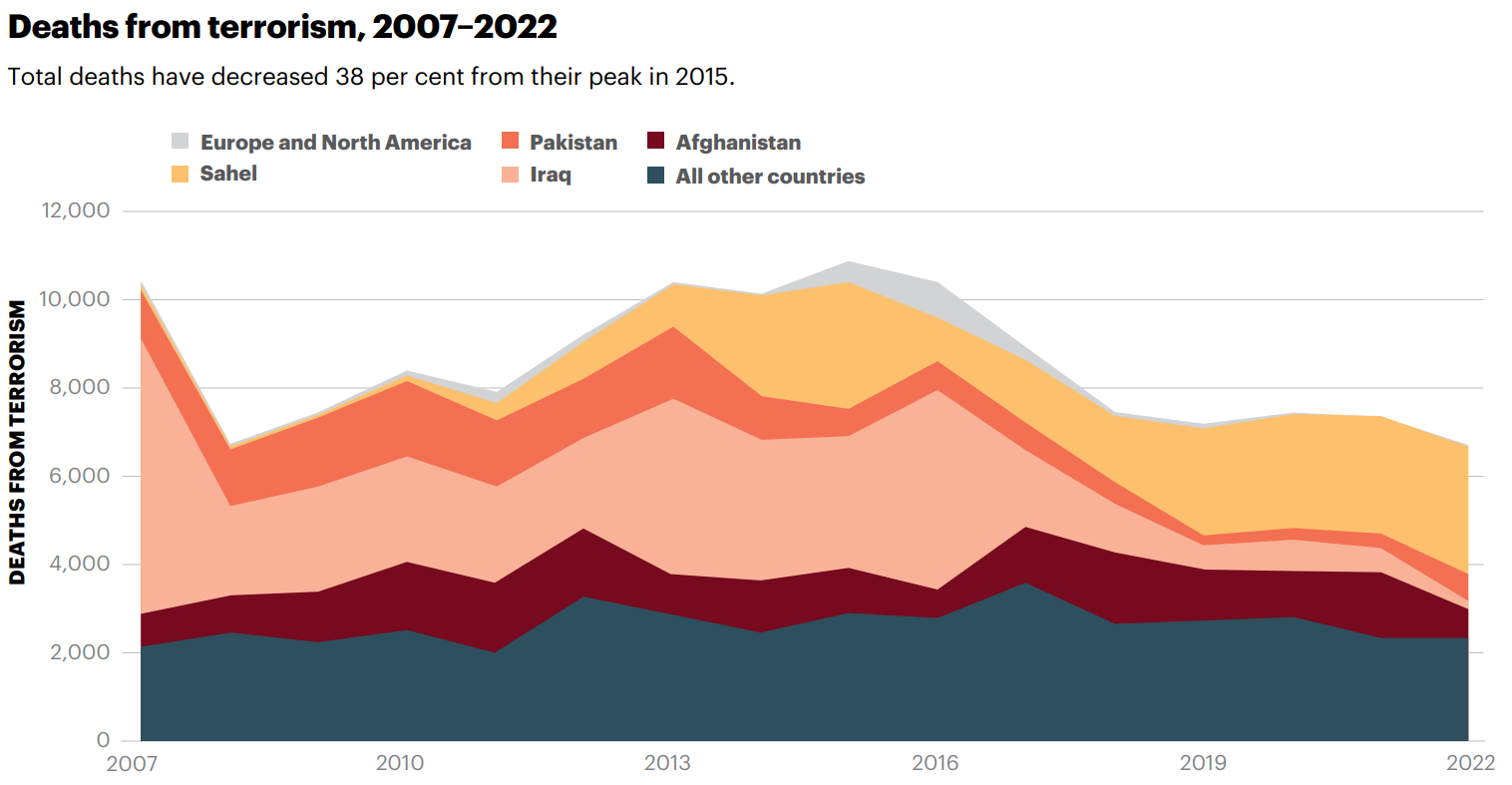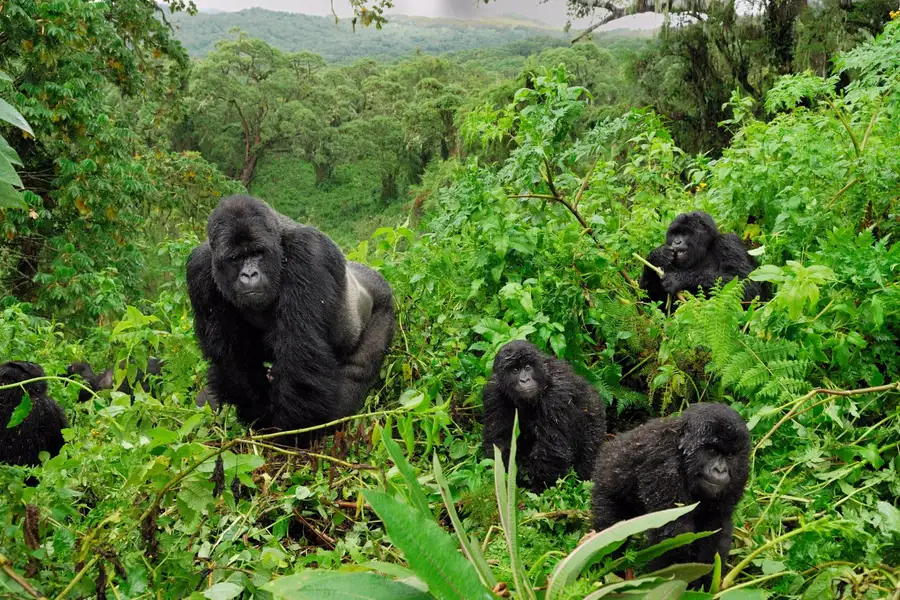Good news you probably didn't hear about
Club of Rome, the most influential neo-Malthusians of the 20th century, have published a follow-up to their seminal 1972 Limits to Growth study, saying their long-feared "population bomb" may never go off. Based on current trends, they're now estimating global population will peak at 8.6 billion, a figure that will no doubt make just as many headlines as past predictions of doom. New Scientist
Deaths from tuberculosis in Africa fell by 26% between 2015 and 2021, saving an estimated half a million lives. “African countries have made remarkable progress against TB. The question is no longer about whether we can end TB, but how fast we must act to reduce the disease burden, save lives and maintain a high momentum towards a TB-free world." WHO
Nigeria has made substantial progress in its fight against AIDS, with annual deaths declining from 264,463 in 2015 to 51,000 in 2022. Most of this is due to expanded access to treatments: the number of patients receiving anti-retroviral therapies has increased from 800,000 in 2017 to over 1.8 million today. Punch
Kenya is scaling up its rollout of the Mosquirix malaria vaccine, after a pilot program for 400,000 children was shown to substantially reduce deaths in eight counties. Early modelling estimates that one life is being saved for every 200 children vaccinated. This is big - there are an estimated 3.5 million cases of malaria in Kenya every year. ABC
Deaths from terrorism have fallen by over a third since their peak in 2015, with two of the largest decreases occurring in Iraq and Nigeria in the last 12 months. Dividing the world into nine regions, the impact of terrorism fell in seven of them in 2022, and 121 countries experienced no deaths at all, the highest number since 2007. Vision of Humanity

Child mortality rates in Laos fell to a level on par with some OECD countries in 2022, thanks to significant strides in hygiene and health promotion. The country has also recorded a 78.7% reduction in maternal mortality over the last two decades, one of the fastest-falling rates in the world. Loatian Times
The proportion of teenage girls in New Zealand giving birth has halved in the last 10 years, and child poverty has fallen dramatically, with 77,000 fewer children living in low income households compared to 2018, and eight of nine child poverty measures seeing a statistically significant reduction during the same period. National Tribune
For the first time in its history, Canada's population grew by over one million people last year and almost all of that was from immigrants, including over 133,000 Ukrainian refugees. The growth comes as the federal government makes a push to raise its 2025 immigration targets by almost 25%. NYT
Good news from the United States. Oregon just approved $200 million for the state's homeless, Maryland has passed a bill extending Medicaid coverage for transgender people, Washington state has upheld a new tax on the wealthy to fund education, Tennessee is seeing historic reductions in child poverty, and Seattle has become the first US city to outlaw discrimination on the basis of caste.
Substantial majorities of Americans think progress toward inclusion and diversity is on the right track. In a new poll, 86% believe more should be done to promote gender equality, 69% say more should be done to foster acceptance of LGBTQ people, 70% think businesses should promote racial diversity, and 58% are happy with new pronouns.
Bangladesh isn't just ground zero for climate disaster. It's also a hotspot for solutions, where a mix of technology and community have resulted in cyclone-related mortality declining more than 1,000-fold in the past 40 years. I tell my American friends, "You should send your sceptics to Bangladesh! We have gone through the doom and gloom phase. Now it's all about solutions." NPR

Get a Better Version of This Newsletter
Have you thought about becoming a member of Future Crunch? In this week's members-only edition, we had some pretty astonishing news about how rooftop solar in China has suddenly become one of the world's greatest sources of climate hope. We also shared a video that finally shows what an actual lightning strike looks like, and learned something brand new about dog noses. Yep. Dog noses. It's just $50 a year which is way cheaper than anything Elon Musk is offering right now.
The only home we've ever known
Participants at the UN Water Conference last week pledged billions of dollars and made over 700 commitments to ensure a water-secure future for everyone. It's welcome news: despite substantial progress in the last two decades, two billion people still lack access to safe drinking water and 40% of the global population are impacted by water scarcity. UN
The commitments at this Conference will propel humanity towards the water-secure future every person on the planet needs.
António Guterres, Secretary-General, United Nations
The biggest commitment of all was the Freshwater Challenge, the largest-ever global initiative to restore rivers, lakes, and wetlands. Driven by Colombia, the DRC, Ecuador, Gabon, Mexico and Zambia, the project aims to restore 300,000 kilometres of rivers and 350 million hectares of wetlands (an area larger than India) by 2030. UNEP
Reintroduction programs are forging ahead in the world’s two most populous countries: 200,000 Chinese sturgeons were recently released back into the Yangtze as part of China’s re-wilding efforts, and India welcomed four cheetah cubs, the first in-country birth since the species was declared extinct there 70 years ago. The mother was relocated from Namibia last September.

The EU is upholding its 2018 neonics ban and cracking down on temporary exemptions for bee-toxic pesticides. It closes an important loophole. In the last four years more than 236 exemptions for banned pesticides were granted in European countries, with neonicotinoids accounting for almost half. Euractiv
The US government has withdrawn a land-swap deal that would allow the construction of a road through Alaska’s Izembek National Wildlife Refuge, an area originally protected under President Jimmy Carter. The move is good news for geese and other migrating birds that use the wetlands as a migratory stopover. NYT
After a 400-year absence, beavers are coming back to London! Conservation groups have created the UK’s first urban reintroduction site for a breeding pair of Eurasian beavers that will arrive later this year. The project is one of 22 across the city that have been greenlit as part of the Rewild London Fund. Guardian
We are hoping to challenge perceptions, and demonstrate how London, too, can embrace these ecosystem engineers as we strive for a healthier, wilder future in which our capital can become a leader in urban rewilding.
Elliot Newton, Co-founder, Citizen Zoo
The number of privately protected areas in South America has exploded in the past two decades, and these areas now cover around two million hectares. Most are collectively owned by campesino communities or smallholder families, and the real numbers may be higher, as many landowners who do conserve their land aren’t officially registered. Mongabay

This year’s Ramadan will be greener, with mosques around the world banning single-use plastics ahead of breaking fast and some banning plastics all together. Links between Islam and sustainability are nothing new - the Quran instructs Muslims “to be mindful of God’s creation and care for the environment.” WEF
Iraq has announced a plan to plant five million palms and trees to combat high temperatures and water scarcity and to create windbreaks against dust storms. Saudi Arabia has already commenced its plan to plant 10 billion trees on its territory by 2031 as well as 40 billion additional trees in collaboration with other countries. Phys.org
A 20-year project combining public health and conservation has brought mountain gorillas in Uganda back from the brink of extinction. Improvements in community sanitation and hygiene have resulted in fewer gorillas picking up human diseases. In 1997 there were only 650 mountain gorillas in the wild, by 2018 there were 1,063, and conservationists expect another increase at the next census. New Scientist
We realised that to make sure wildlife stays healthy, we have to improve the health of people who interact with it. And to ensure that people stay healthy, you have to make sure they’re not getting diseases by poaching wildlife.
Gladys Kalema-Zikusoka, Wildlife Vet, Bwindi Impenetrable National Park

That's it for this edition, thanks for reading. We'll see you next week.
With love,
FC HQ
Enjoy this newsletter?
Forward to a friend and help us spread this stuff around.
Leave a comment by clicking on the button below.





